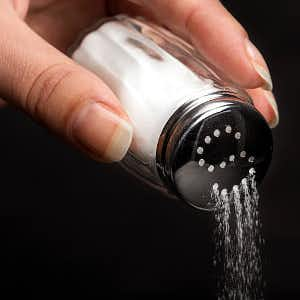
If you have high blood pressure, chances are good that your doctor has told you to reduce salt in your diet. Epidemiological studies show that highly-processed high-sodium diets go hand in hand with high blood pressure. Too much sodium from salt is definitely dangerous for your blood pressure, but is it possible to reduce salt too much? A study presented at the Experimental Biology 2017 meetings in Chicago (April 22-26) reported something heretical. The researcher who presented the results, Dr. Lynn Moore, could not have put it more frankly:
“We saw no evidence that a diet lower in sodium had any long-term beneficial effects on blood pressure. Our findings add to growing evidence that current recommendations for sodium intake may be misguided.”
The Dangers of Very Low Sodium:
Q. I have known several healthy older Americans who ate a reduced salt diet and nearly died. When they landed in the emergency room in trouble, their blood tests showed very low sodium levels. Once IV fluids with sodium were added, their health popped back into shape immediately.
How Much Should Your Reduce Salt Intake for Good Health?
A. Public health experts often recommend that Americans consume as little salt as possible to keep blood pressure under control. That’s why the 2015-2020 Dietary Guidelines recommend that sodium intake be kept under 2,300 mg/day. The American Heart Association calls for no more than 1,500 mg daily for most adults.
What Does the Research Say?
Data from the new study suggest, however, that restricting sodium may not benefit blood pressure. The Framingham Offspring Study included more than 2,600 men and women between 30 and 64. All the volunteers had normal blood pressure when the study started, 16 years ago. Surprisingly, by the end of the study, the average blood pressure of people whose sodium intake stayed under 2,500 mg a day was higher than the blood pressure of people who consumed more sodium.
Man Bites Dog!
When a story contradicts conventional wisdom we call it a man-bites-dog story. We recently wrote about a similar saturated fat paradox.
Modern medicine has a hard time adapting to new data. When a belief is repeated enough times by enough experts it becomes entrenched. Lower salt intake will lower blood pressure and reduce heart attacks is just such a belief. Authorities in the field strongly criticize any data contradicting that conviction.
Challenging the American Heart Association (AHA):
The idea that low sodium intake could lead to higher blood pressure could get you burned at the American Heart Association stake. And yet this is not the first study to suggest that very low sodium levels could be harmful.
One of the grand old men of cardiology is Franz H. Messerli, MD. He is one of the world’s leading experts on the treatment of hypertension. Together with colleagues he has written a scathing commentary in the American Journal of Medicine (April, 2017) titled:
Salt, Tomato Soup, and the Hypocrisy of the American Heart Association.”
We encourage you to read the short (1.5 pages) article. Here is a teaser:
“A low sodium intake has been documented to stimulate the sympathetic nervous system and the renin-angiotensin-aldosterone cascade, both of which may be associated with increased cardiovascular disease events and mortality. Clearly, with sodium restriction, as is true more often than not in medicine, one size does not fit all.”
Dr. Messerli’s last sentence sums it up best:
“Perhaps, then, the AHA should take to heart the dictum of H. L. Mencken”:
“For every complex problem there is an answer that is clear, simple, and wrong.”
Should you wish to read another article we have written about sodium, here is a link.
Goldilocks and the Three Bears!
Have you ever read the story about Goldilocks and The Story of the Three Bears? Of course you have. In the sanitized version, Goldilocks liked her soup not too hot nor too cold but “just right.” That’s kind of where we think salt should be…not too high or too low.
Here is what happened to Elizabeth when her sodium fell too low (hyponatremia):
“I read with interest your article on low sodium. In October, 2014, I fell and hit my head and ended up in the trauma ICU for 4 days with 4 staples in my head to close the cut.
“Diagnosis: Hyponatremia! I had walked to my neighbor’s house to check on his cat while he was on vacation. Oddly, I do not remember walking to his house or how I got back to my house. I do not recall that anything out of the ordinary existed before that time. Additionally, I do not remember going to the hospital (EMS) or anything while in the hospital for 2-3 days.
“My sodium level was 116, dangerously low from the normal of 135-145. I was taking a diuretic (hydrochlorothiazide) in connection with blood pressure medicine (Exforge).”
Douglas in South Central New York also shared what happens when sodium levels drop into the danger zone:
“Could insufficient salt intake lead to unsteadiness on the feet and an elevated BP?
“In other words could some people actually have LOWER blood pressure by moderate use of some sea salts?
Douglas, if we are to believe the latest research from the Framingham Offspring Study, the answer is yes.

